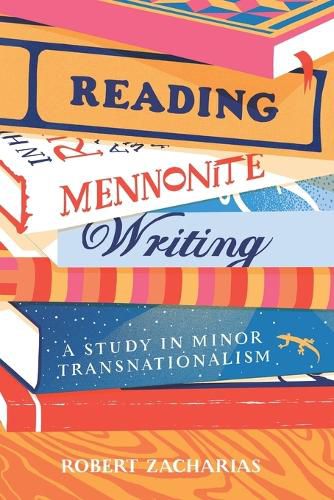Readings Newsletter
Become a Readings Member to make your shopping experience even easier.
Sign in or sign up for free!
You’re not far away from qualifying for FREE standard shipping within Australia
You’ve qualified for FREE standard shipping within Australia
The cart is loading…






This title is printed to order. This book may have been self-published. If so, we cannot guarantee the quality of the content. In the main most books will have gone through the editing process however some may not. We therefore suggest that you be aware of this before ordering this book. If in doubt check either the author or publisher’s details as we are unable to accept any returns unless they are faulty. Please contact us if you have any questions.
Mennonite literature has long been viewed as an expression of community identity. However, scholars in Mennonite literary studies have urged a reconsideration of the field's past and a reconceptualization of its future. This is exactly what Reading Mennonite Writing does.
Drawing on the transnational turn in literary studies, Robert Zacharias positions Mennonite literature in North America as "a mode of circulation and reading" rather than an expression of a distinct community. He tests this reframing with a series of methodological experiments that open new avenues of critical engagement with the field's unique configuration of faith-based intercultural difference. These include cross-sectional readings in nonnarrative literary history; archival readings of transatlantic life writing; Canadian rewritings of Mexican film's deployment of Mennonite theology as fantasy; an examination of the fetishistic structure of ethnicity as a "thing" that has enabled Mennonite identity to function in a post-identity age; and, finally, a tentative reinvestment in ideals of Mennonite community via the surprising routes of queerness and speculative fiction. In so doing, Zacharias reads Mennonite writing in North America as a useful case study in the shifting position of minor literatures in the wake of the transnational turn.
Theoretically sophisticated, this study of minor transnationalism will appeal to specialists in Mennonite literature and to scholars working in the broader field of transnational literary studies.
$9.00 standard shipping within Australia
FREE standard shipping within Australia for orders over $100.00
Express & International shipping calculated at checkout
This title is printed to order. This book may have been self-published. If so, we cannot guarantee the quality of the content. In the main most books will have gone through the editing process however some may not. We therefore suggest that you be aware of this before ordering this book. If in doubt check either the author or publisher’s details as we are unable to accept any returns unless they are faulty. Please contact us if you have any questions.
Mennonite literature has long been viewed as an expression of community identity. However, scholars in Mennonite literary studies have urged a reconsideration of the field's past and a reconceptualization of its future. This is exactly what Reading Mennonite Writing does.
Drawing on the transnational turn in literary studies, Robert Zacharias positions Mennonite literature in North America as "a mode of circulation and reading" rather than an expression of a distinct community. He tests this reframing with a series of methodological experiments that open new avenues of critical engagement with the field's unique configuration of faith-based intercultural difference. These include cross-sectional readings in nonnarrative literary history; archival readings of transatlantic life writing; Canadian rewritings of Mexican film's deployment of Mennonite theology as fantasy; an examination of the fetishistic structure of ethnicity as a "thing" that has enabled Mennonite identity to function in a post-identity age; and, finally, a tentative reinvestment in ideals of Mennonite community via the surprising routes of queerness and speculative fiction. In so doing, Zacharias reads Mennonite writing in North America as a useful case study in the shifting position of minor literatures in the wake of the transnational turn.
Theoretically sophisticated, this study of minor transnationalism will appeal to specialists in Mennonite literature and to scholars working in the broader field of transnational literary studies.